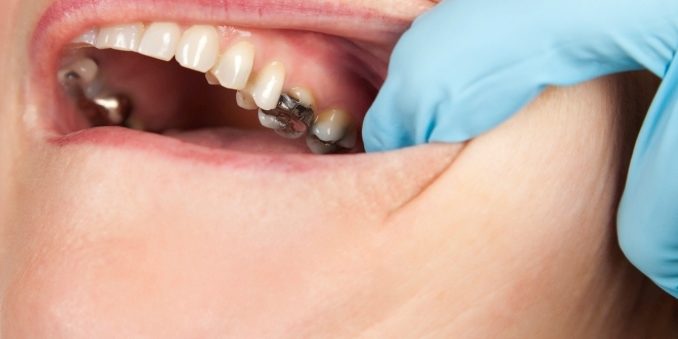Mercury, the only metallic element that is a liquid under standard temperature and pressure conditions, is widely utilized in many industries and processes. It has been used as a component of dental amalgam since ancient times and is found in fluorescent tubes and thermometers; it is also released into the environment as a result of industrial processes, such as smelting, mining, and energy production. Some mercury is introduced due to naturally occurring phenomena, such as volcanic eruptions.
This widespread presence of mercury facilitates the possibility of its introduction into the body, where it can cause either chronic or acute poisoning. The simplest ways to avoid mercury exposure in your immediate environment are to remove fluorescent tubes and thermometers (or, at least, to handle them with extreme care to avoid breakage), to avoid consumption of certain types of fish known to harbor high accumulations of mercury in their tissues, and to undergo a process of safe amalgam removal to replace old fillings with a substitute amalgam that eliminates the possibility of mercury toxicity.
Mercury toxicity symptoms are many; mercury poisoning takes a heavy toll on the body, affecting the neurological and central nervous systems, as well as the gastrointestinal, immune, neuromuscular, and cardiovascular systems. Major organs, such as the brain, liver, and kidneys, also suffer as a result of mercury toxicity.
A wide variety of symptoms is attributed to toxicity resulting from mercury amalgam. This list includes but is not limited to:
- Headache, fatigue, loss of concentration, irritability, depression, insomnia, and dizziness
- Diverticulosis, stomach cramps, bloating, loss of appetite, and gastrointestinal disturbances
- Muscle fatigue and tremors, sciatic and chest pains, leg cramps, joint pain, and tachycardia
- Oral health problems, such as bad breath, blisters/sores, tender teeth, and bleeding gums
Multiple studies have reported on both the symptoms associated with mercury toxicity and the likelihood of treatment to mitigate the effects of mercury toxicity. These studies investigated the cases of hundreds of patients who were poisoned by mercury. In most cases, a positive effect (reversal or improvement in symptoms) was later observed in patients who were treated by safe removal of mercury amalgam, suggesting that mercury toxicity had been a likely cause of their symptoms.
Our next article discusses how your systems react to the presence of mercury in the body and the types of health damage that may result from mercury toxicity.
A safe, effective program for removal of mercury amalgam is the first step toward reversing the effects of mercury toxicity in your body. The Center for Systemic Dentistry in Berkeley Heights, New Jersey, is committed to being the state’s leading dental practice that focuses on holistic, healing-focused dentistry. Dr. Philip Memoli is ready to help you recover your health so you can begin to lead a life free of mercury toxicity.
The Center for Systemic Dentistry will work with you to determine the best course of treatment to safely remove your existing mercury amalgam. Call us today at (908) 464-9144 or contact us via our online contact form.
Read more about safe amalgam removal at http://www.holisticdentistrynj.com/our-services/safe-mercury/.
Mercury, the only metallic element that is a liquid under standard temperature and pressure conditions, is widely utilized in many industries and processes. It has been used as a component of dental amalgam since ancient times and is found in fluorescent tubes and thermometers; it is also released into the environment as a result of industrial processes, such as smelting, mining, and energy production. Some mercury is introduced due to naturally occurring phenomena, such as volcanic eruptions.
This widespread presence of mercury facilitates the possibility of its introduction into the body, where it can cause either chronic or acute poisoning. The simplest ways to avoid mercury exposure in your immediate environment are to remove fluorescent tubes and thermometers (or, at least, to handle them with extreme care to avoid breakage), to avoid consumption of certain types of fish known to harbor high accumulations of mercury in their tissues, and to undergo a process of safe amalgam removal to replace old fillings with a substitute amalgam that eliminates the possibility of mercury toxicity.
Mercury toxicity symptoms are many; mercury poisoning takes a heavy toll on the body, affecting the neurological and central nervous systems, as well as the gastrointestinal, immune, neuromuscular, and cardiovascular systems. Major organs, such as the brain, liver, and kidneys, also suffer as a result of mercury toxicity.
A wide variety of symptoms is attributed to toxicity resulting from mercury amalgam. This list includes but is not limited to:
- Headache, fatigue, loss of concentration, irritability, depression, insomnia, and dizziness
- Diverticulosis, stomach cramps, bloating, loss of appetite, and gastrointestinal disturbances
- Muscle fatigue and tremors, sciatic and chest pains, leg cramps, joint pain, and tachycardia
- Oral health problems, such as bad breath, blisters/sores, tender teeth, and bleeding gums
Multiple studies have reported on both the symptoms associated with mercury toxicity and the likelihood of treatment to mitigate the effects of mercury toxicity. These studies investigated the cases of hundreds of patients who were poisoned by mercury. In most cases, a positive effect (reversal or improvement in symptoms) was later observed in patients who were treated by safe removal of mercury amalgam, suggesting that mercury toxicity had been a likely cause of their symptoms.
Our next article discusses how your systems react to the presence of mercury in the body and the types of health damage that may result from mercury toxicity.
A safe, effective program for removal of mercury amalgam is the first step toward reversing the effects of mercury toxicity in your body. The Center for Systemic Dentistry in Berkeley Heights, New Jersey, is committed to being the state’s leading dental practice that focuses on holistic, healing-focused dentistry. Dr. Philip Memoli is ready to help you recover your health so you can begin to lead a life free of mercury toxicity.
The Center for Systemic Dentistry will work with you to determine the best course of treatment to safely remove your existing mercury amalgam. Call us today at (908) 464-9144 or contact us via our online contact form.
Read more about safe amalgam removal at http://www.holisticdentistrynj.com/our-services/safe-mercury/.








